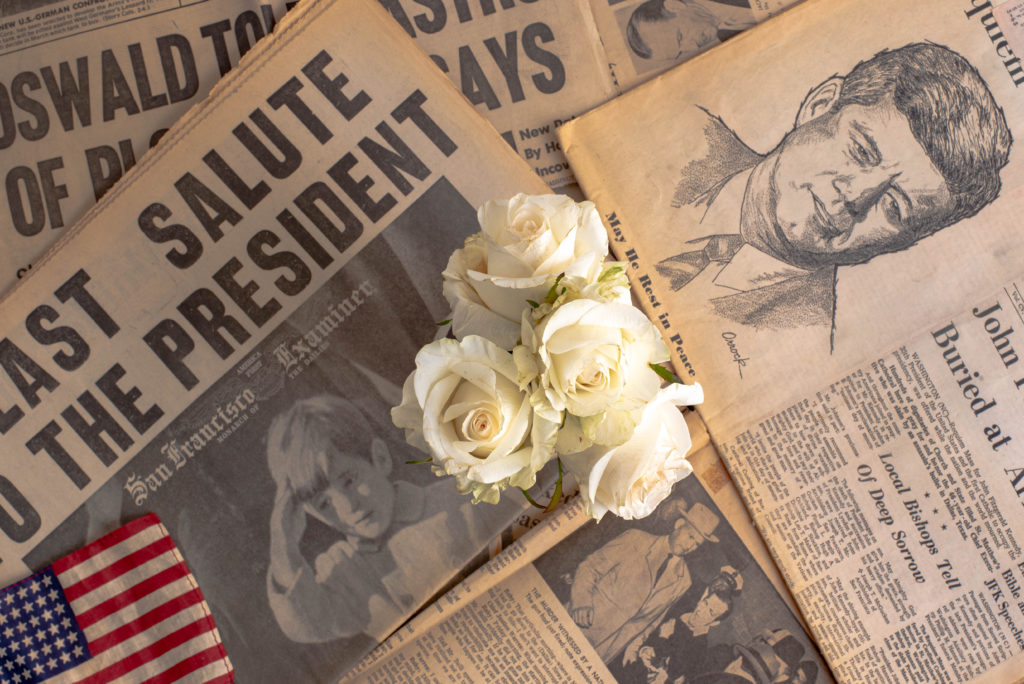Friday, Nov. 22, 1963, is one of those “I remember exactly where I was” dates in history. It was my first.
I was sitting in the first grade classroom in the “old” building at St. Elizabeth School when our principal Sister Ann Gabriel came in and interrupted class. There was something very wrong. One never saw the formidable Sister Ann Gabriel ever looking vulnerable but, on this day, even a bubble-headed first-grader could sense something was amiss.
Our class was marched out of the old building and straight across to St. Elizabeth Church where we joined all the other grades who had been marched in before us and we prayed for the president of the United States. I was not sure why we were praying for him, but soon, news percolated through the pews that the president had been shot.
After dutifully praying for what we were initially told was a wounded president, we were marched back into our classrooms. It was not long after that Sister Ann Gabriel returned. This time she had tears in her eyes and informed us the president was dead and that school would be closing. We lived only a block from church and school, so I joined up with older siblings likewise liberated from their classrooms and we walked home together.
I was six, not especially well-versed in national politics, so I was more focused on the freedom of an early break from school. That would change when we approached our house. It was a large two-story Craftsman house with a flagpole in the side yard. The flag was out. That was something we only did on Memorial Day, Flag Day, Veterans’ Day, the Fourth of July, or if Jehovah Witnesses were on our block handing out copies of the Watchtower.
I never did understand why or how the raising of the flag was supposed to repel door-to-door non-Catholic proselytizers. But I did know, with all the military people in my family, that a flag was supposed to always be flying at the top of a flagpole. On this day, the flag fluttered from the mid-section of the pole.
On a day that was going to burn a host of images and thoughts into my hippocampus, I was overwhelmed by the silence I found inside the house. That was something totally alien within a domicile with so many people living in it. The TV was on, but it was the news — on every channel, and there were only three networks and four local channels.
My mom was terribly upset. This day was going to be forever etched in her heart, and mine, for another reason. On the morning of that historic day, my grandfather was tooling around in his backyard tending his robust garden when, struggling to dig out a tree trunk, he died suddenly from cardiac arrest. While we were still at school, blissfully unaware of what was happening in Dealey Plaza in Dallas, we were also unaware of what was happening a stone’s throw from our own house.
The news from Dallas became background noise, as our mom sat us down to tell us that our grandfather had passed. For the next couple of days, a low-hanging fog of sorrow blanketed our household. Our uncle, our dad’s brother, who shared the house with us, had his own grief. He had empathy for our mom for sure, but he practically worshiped Kennedy. Our dad did not hold the same opinion. For years before that dreadful day in November, the Kennedy family was fodder for Sunday dinner “conversations.”
I knew my grandfather voted for Kennedy for the solitary reason that he had a “D” after his name. The fact that my unreconstructed Arkansas farmer grandfather, who had a high opinion of Jim Crow laws and a low opinion of any religion, voted for Kennedy and my Irish Catholic faith-filled father did not says something not only about the intricacies of the body politic in America but also about God’s sense of irony.
It has been theorized that the Kennedy assassination swept away the lingering innocence of the 1950s and ushered in the tumult of the 1960s. If the global news was the macro of earth-shaking transitions, then our family certainly experienced a micro version that very same day with the passing of my grandfather.
My grandfather had two legacies: one he inherited from his own Civil War veteran grandfather (you can guess which side he fought for) that embodied the “Old” South, and one of love, acceptance, and tolerance toward his own children and grandchildren that filtered all the way down to his last grandchild.
We all lost a lot on that November day.

